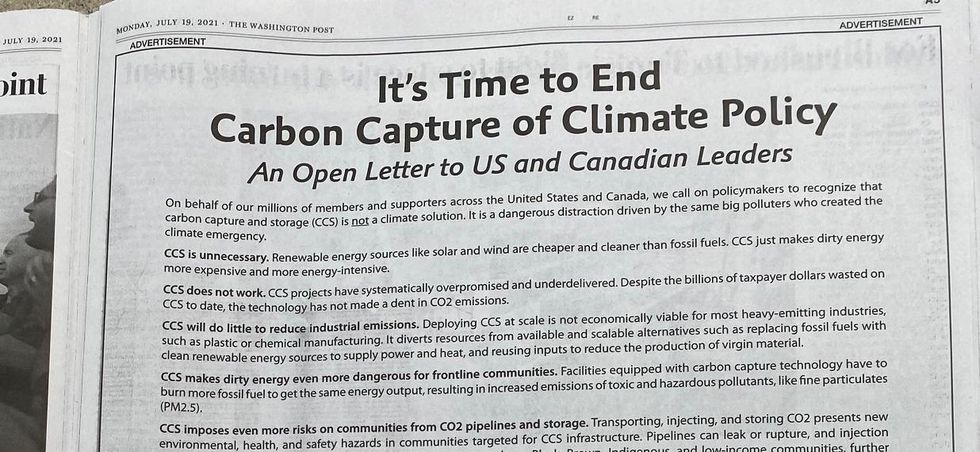
Climate activists pan carbon capture plans
'There are still no projects operating anywhere in the world that have delivered on time, on budget, or in the quantities promised.'
More than 500 environmental and community groups – from the Nassau Hiking & Outdoor Club to Greenpeace USA – have called on United States and Canadian leaders to abandon efforts to capture carbon emissions from fossil fuels and work harder to curb fossil fuel use in the first place.
The technology, known as "carbon capture and storage," or CCS, attempts to collect carbon dioxide generated by coal- or gas-fired power production or plastics manufacturing. Those "captured" emissions then get pumped to sites where they are used for industrial processes or stored underground.
But a campaign, coordinated by Center for International Environmental Law, counters that "at best" CCS prevents some emissions from reaching the atmosphere – provided the captured gases are not later released.
At worst, the coalition claims, CCS masks emissions, increases pipeline infrastructure, and prolongs the fossil fuel era.
No climate change solution

The coalition of 500 international, US, and Canadian organizations sent an open letter to policymakers Monday, calling on them to reject carbon capture and storage schemes as they are "unnecessary, ineffective, exceptionally risky, and at odds with a just energy transition and the principles of environmental justice.
The letter was accompanied by full-page ads in The Washington Post and The (Ottawa) Hill Times.
"Simply put, technological carbon capture is a dangerous distraction," the coalition said. "We don't need to fix fossil fuels, we need to ditch them."
Proponents: Critical for the Paris Agreement
Proponents of the technology counter that developing CCS is critical if the United States and other countries are to meet the emissions-reduction goals outlined in the Paris Agreement.
"It's one of the few proven technologies with the potential to significantly lower emissions from certain hard-to-decarbonize sectors, such as manufacturing and heavy industry," said Joe Blommaert, president of ExxonMobil Low Carbon Solutions in a statement.
The technology has long been part of efforts to trim emissions – or at least meet climate goals. The Obama administration spent at least $2.4 billion on carbon capture and storage efforts. Last month President Biden's White House Council on Environmental Quality delivered a report to Congress outlining steps for a "responsible, orderly, and efficient" development of the technology.
Few climate successes
But the field has seen few successes.
The FutureGen Alliance attempted to demonstrate capture of carbon dioxide from an Illinois coal-fired power plant. The waste emissions were to be pumped and sequestered 30 miles away in underground saline formations.
First announced by President George W. Bush in 2003, construction on FutureGen started in 2014 after delays, cancelations, reinstatements and relocations. After spending $1.65 billion, the Department of Energy suspended the project in 2015.
More recently, Chevron on Monday conceded that it fell short of its carbon capture targets after spending $3 billion to bury emissions under an island off Western Australia.
"This result is no surprise," said senior researcher Tim Baxter of the Climate Council. "After decades of CCS research and billions of dollars of investment, there is little to show for it."
"Over the past decade, the costs of renewable energy like wind and solar have plummeted. Over the same period, CCS has remained extremely expensive. There are still no projects operating anywhere in the world that have delivered CCS on time, on budget, or in the quantities promised."
Top photo courtesy U.S. Department of Energy













